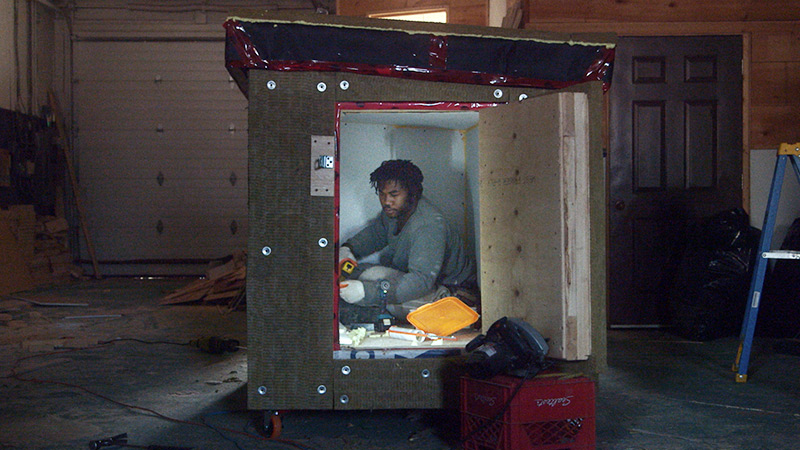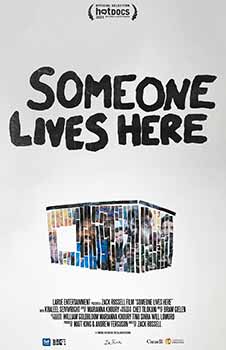Home Is Where the Heat Is
by Thom Ernst – Film Correspondent
(May 5, 2023 – Toronto, ON) Zach Russell appears on my computer screen. His background is a brick wall. It’s an appropriate setting to stage a minimalist mood; appropriate in that Zach’s film Someone Lives Here, follows the attempts of one Toronto man building self-heat generating boxes to protect the unhoused from the elements. Boxes might seem a crude alternative to temporary housing, but in truth, the shelters are not much more than just that: boxes. And the recipients, safe, warm, and private, are fine with the bare minimum.
 Zach looks distracted. He might be tired, or bored. I imagine him to be the kind of director who prefers making films to talking about making films. That might be true, but it’s not what’s occupying Zach’s attention. There are other things going on in Zach’s life; the film, the festival, and family. A few moments into a preliminary back-and-forth discussion, I recognize in Zach a man of quiet benevolence and intent. I suspected as much after seeing Someone Lives Here, but if there were any remaining doubt of Zach’s compassion, then it’s gone after our discussion, despite how earnestly Zach works to downplay it.
Zach looks distracted. He might be tired, or bored. I imagine him to be the kind of director who prefers making films to talking about making films. That might be true, but it’s not what’s occupying Zach’s attention. There are other things going on in Zach’s life; the film, the festival, and family. A few moments into a preliminary back-and-forth discussion, I recognize in Zach a man of quiet benevolence and intent. I suspected as much after seeing Someone Lives Here, but if there were any remaining doubt of Zach’s compassion, then it’s gone after our discussion, despite how earnestly Zach works to downplay it.
NS: Wow! This Khaleel Seivwright guy is something of a superhero, isn’t he? That’s how he comes across on screen. He doesn’t seem complex, or conflicted. He just seems like a guy doing what he can.
ZR: He’s incredible. He’s incredible, yeah. He’s really, really, great and just growing as a person who understands the issues with more depth. With all of the experience he had with this, it has given him more power and he’s grown more capable and knowledgeable. It’s a very cool thing to watch. The relationship we had (made) it very hard to cut down the 300 hours to 75 minutes.
NS: While watching the documentary—and I don’t know if this is or isn’t a good thing to say to documentary filmmakers—I kept thinking how great a scripted movie this would make. You got an amazing hero in Khaleel, but a few bureaucratic villains. But there is balance. Even while Khaleel bucks up against governmental red tape that prevents him from saving lives, he’s still capable of understanding the city’s point of view.
ZR: Absolutely. I think he (can) understand the issue from many sides including the cities and that’s unique to him. Not everyone is that generous with trying to understand something from multiple angles. There’s a scene in the film where he’s reading comments on a Blog TO article about the testimonials video. We made videos of all these tiny shelter residents talking about their experiences. Part of it is featured in the film. Some homeowners comment, “I don’t want this near my house”. (Khaleel’s) the reaction is (to) laugh and he says “That’s reasonable”. So, he’s working from a space of what’s reasonable and what’s true as opposed to who can we blame. (Khaleel) is looking for solutions and gets most excited by things working as opposed to conflict. It’s not a search for conflict, it’s a search to do something that works.
NS: He’s clearly an advocate for helping people make it through the night. Who can argue against that? But then there is a character in your film, a woman who complains about the parties, the fireworks, and the noise. And when the park is clear of shelters, her dog rolls around on the grass and she says something like, “This is what we’re missing”. It made me think, “Oh great glad your dog is happy”. But despite my annoyance with the woman your film doesn’t frame her as a joke, or insensitive.
ZR: Good. I really didn’t want to (be insensitive to her opinion). Khaleel and I have a very similar ethos I think which is that we are interested in something that’s balanced and that gets as close to this idea of truth as you can get. And that means all the sides of something. I am so grateful to her for wanting to talk to me knowing exactly how she was coming off. She was always saying, “I’m worried I’m going to be the (villain). But she really believes in what she is saying. I’m glad that you don’t think I set her up because I think that it’s really important, we understand why people think the way they think even if we don’t agree.
NS: If we see Khaleel as ‘saintly’ for devoting his time and effort to the cause of sheltering the homeless, then by association, aren’t you too something of the same for making Someone Lives Here?
ZR: (visibly cringes) I would say I’m lucky. And it’s not just humbleness It’s very possible for many people to do very similar things. It’s coming from a desire to welcome others to do similar things. (Anything else) feels like an abdication of responsibility. Not to become aggressive about it, but it’s like what’s a Saint? You could do the same thing. You totally have the capacity and can join. I’m like join! Join! Join! You too you can come along. We can all do this thing. Does that make sense?
NS: It makes sense, but I wonder if perhaps some joining isn’t hoping to grab a piece of sainthood for themselves.
ZR: Well, it’s a slog (building the shelters) but also fun. I had fun and the volunteers had an amazing time it was fun to hang out with Taka (*Taka is the invisible narrator in the film) in her tiny shelter for 5 months. It was hard and sad but it was also fun. And (Taka’s) now one of my closest friends. It was hard and sad to have everyone—some people who are still living in parks—come into a cinema and watch their trauma be depicted on the screen on the weekend we had our premiere, with the Scotia Bank wealth ads before the movie and this whole mechanism of a film festival crashing into an unhoused population. We can celebrate the film and we can also recognize that it’s just a film and that a lot of people are really suffering right now. (They) exist. It’s traumatic for people.

NS: Okay so there’s a bounce back and forth. That seems to be a theme of our conversation. The yin and yang in all of this. When I hear of people befriending people who are in need I wonder if that friendship becomes a burden. Particularly if you’re in a different social standing.
ZR: That’s everyone’s fear and the only way I’ve been able to dispel it is to try and it turns out it’s completely dependent on the person that you’re becoming friends with. Sometimes my relationship with millionaires can be very burdensome and they can ask a lot of me and my relationship with someone that is precariously housed can be really really generous. It just depends on the person. It’s not hard to have cross-class friendships. It’s no harder than having the mother that you owe things to, it’s no harder than an employer. They’re just relationships. I’m best friends with Taka who had been homeless for three years. I find that in my relationship with Taka so aware of not crossing boundaries and not overstepping. I was aware of that when we were first working together. It’s way more respectful than people that I’ve been friends with since University who are housed and have jobs. In relation to the film, I didn’t give her housing right away, I gave her maybe a bite to eat and I helped her get a tiny shelter but one thing that I really feel like I’ve given her is the experience of being in a film and not needing to show her face. It’s a small gift but it’s the only thing that I feel like I’ve really given her. It’s interesting, it’s a weird thing to give someone but it feels significant to me and I’m glad that I did and she’s glad that she did too. She came to the screening and had an amazing time but she had the freedom of not having to deal with people’s projections and she can continue to live her life and not feel as out there and as vulnerable. When you are a public figure (like Khaleel) it’s a risky experience. Khaleel was put through a lot and was quite scared of the government and what they were going to do. And also living as a black man doing something illegal. It’s no small risk and so I appreciate when people don’t want to risk their whole self in that way.
NS: Ah yes, back to Khaleel, this non-confrontational beautiful man. I really like him. He kind of breaks a lot of ignorant stereotypes—a black man, once homeless dude contributing the best he can—and a beer drinker! What’s not to like?
ZR: Yeah. I have never met anyone like him. I’m just glad he trusted me. As far as the stereotype thing I mean I never even thought of that. I was so focused on what he was doing that it was only when he said “Every time I come in the park I’m worried that a cop is going to roll up” which is the first thing we hear in the film. That was the first time I went, “Oh right you are a man of color doing something that is (technically) illegal and that is like a crazy risk”. The other thing that drew me to him is that he didn’t want to be public and he didn’t want to put his name on (the shelters). He only put his name on (the shelters) because he thought no one would give him money if he didn’t. He wanted to make more (shelters) so, it’s all coming from this egoless place. That is exciting to me. I see a lot of documentaries profiling people who are famous already and it feels like it’s about ego. I guess I’m more drawn to people who don’t have that ego drive and that are motivated by something different.
 NS: This is your first feature-length film. Do you plan to continue with documentary filmmaking or are you going to try to do scripted drama?
NS: This is your first feature-length film. Do you plan to continue with documentary filmmaking or are you going to try to do scripted drama?
ZR: I’m keen to go to scripted. I’m keen to pull some of the people and the experiences that I’ve had in the last 3 years into something scripted because I’m yearning for a little more freedom and I’m yearning for a little more comedy. My background is scripted and making a documentary is a punishing long endeavor. But I’m also obsessed with this issue and it’s going to have a huge impact on the next thing I make.
NS: You know, after seeing Someone Lives Here, I knew I was going to like you as much as I like the film you made. I’m not disappointed. Thanks for taking the time to talk to us.
NOTE: Someone Lives Here had its last screening last night, however, Hot Docs online streaming begins today May 5 and continues until May 9.
Also see: Zack Russell’s filmography.
Also see: The trailer, cast and crew of Someone Lives Here.
![]() Thom Ernst is a Toronto based film critic and writer and an active member of the (TFCA) Toronto Film Critics’ Association. His work has appeared in various publications including Playback Magazine, The Toronto Star, and The National Post. He is known to CBC Radio listeners for his lively contributions to Fresh Air, Metro Morning, and CBC Syndication as well as appearing on-air for CTV News Channel and The Agenda with Steve Paikin. He was host, interviewer and producer of televisions’ longest running movie program Saturday Night at the Movies. Currently he can be heard interviewing Canadian filmmakers on the Kingston Canadian Film Festival podcast, Rewind, Fast-Forward.
Thom Ernst is a Toronto based film critic and writer and an active member of the (TFCA) Toronto Film Critics’ Association. His work has appeared in various publications including Playback Magazine, The Toronto Star, and The National Post. He is known to CBC Radio listeners for his lively contributions to Fresh Air, Metro Morning, and CBC Syndication as well as appearing on-air for CTV News Channel and The Agenda with Steve Paikin. He was host, interviewer and producer of televisions’ longest running movie program Saturday Night at the Movies. Currently he can be heard interviewing Canadian filmmakers on the Kingston Canadian Film Festival podcast, Rewind, Fast-Forward.


